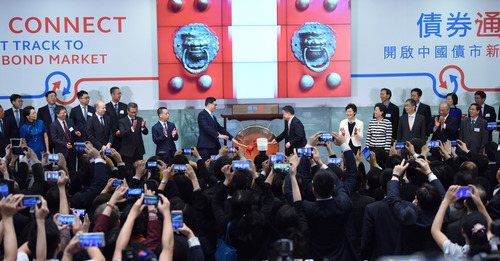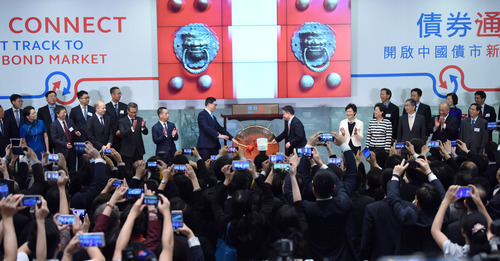
Participants attend a ceremony held by Hong Kong Exchanges and Clearing Limited to launch the "northbound" mainland-Hong Kong bond connect in Hong Kong, south China, July 3, 2017. With the northbound trading kicking off after the ceremony, qualified overseas investors will be able to invest in the Chinese mainland interbank bond market via the mainland-Hong Kong bond connect program.(Xinhua/Wang Shen)
BEIJING, Sept. 24 (Xinhua) -- Southbound trading under Bond Connect, a mutual market access scheme between the Chinese mainland and Hong Kong Special Administrative Region, was launched on Friday, reported Xinhua-run Xinhua Finance.
Southbound trading, which allows institutional investors from the Chinese mainland to invest in Hong Kong bond market through connection between the Chinese mainland and Hong Kong financial infrastructure service institutions, is expected to be the main outbound channel for bond investment, said analysts.
Liu Jie, head of China macro strategy at Standard Chartered Bank, believed that southbound trading can provide investors with more flexibility, lower costs and higher accumulated quota in investment and risk hedging as compared with other traditional outbound investment channels such as qualified domestic institutional investors (QDII), Renminbi QDII, qualified domestic limited partner (QDLP) and qualified domestic investment enterprise (QDIE).
Under southbound trading, the upper ceilings of net cross-border capital outflow are capped under its annual quota and daily quota, which are set at equivalents to 500 billion yuan and 20 billion yuan respectively and may be adjusted by Chinese central bank in accordance with the future cross-border capital flow situations.
Ming Ming, deputy head of the research institute of CITIC Securities predicted that in near future, Hong Kong dollar-denominated bonds and dim sum bonds may benefit more from the start of Southbound Bond Connect as currently, the turnover of the Hong Kong dollar-denominated bonds and dim sum bonds takes up a relatively large proportion in the Central Moneymarkets Unit (CMU), a central clearing and settlement system for public and private debt securities in Hong Kong.
Over the long run, U.S. dollar-denominated bonds issued by companies registered in China or their controlled overseas affiliates in overseas market, may be a more suitable choice for investors as they can enrich their investment targets and satisfy investors with different risk appetites, noted Ming.
Statistics showed that U.S. dollar-denominated bonds, RMB-denominated bonds and euro-denominated bonds accounted for 92.94 percent, 2.68 percent and 2.77 percent of the total bonds issued by companies registered in China or their controlled overseas affiliates in the offshore bond market by September 18.
As Ming held, Hong Kong's market of U.S. dollar-denominated bonds issued by companies registered in China or their controlled overseas affiliates may hail more opportunities alongside the development of southbound trading and the asset shortage of institutions in China will also be effectively eased.
Moreover, financial derivatives market may also embrace new space for development as non-financial corporate bonds made up a high proportion of the U.S. dollar-denominated bonds issued by companies registered in China or their controlled overseas affiliates in Hong Kong and investors may have more need for risk hedging, which is likely to increase demand for the financial derivatives in China, added Ming.
With debut of southbound trading, institutional investors may add their outbound investment in the short term, which may help reduce the pressures of net capital inflows and alleviate the appreciation pressures of Chinese yuan, believed Liu.
Under the southbound trading, China's institutional investors can directly use their foreign currencies or exchange their Renminbi funds into foreign currencies in the interbank foreign exchange market to invest in offshore market, both of which are helpful to realize more balanced cross-border capital flows in the long term, Liu added. (Edited by Duan Jing with Xinhua Silk Road, duanjing@xinhua.org)




 A single purchase
A single purchase









